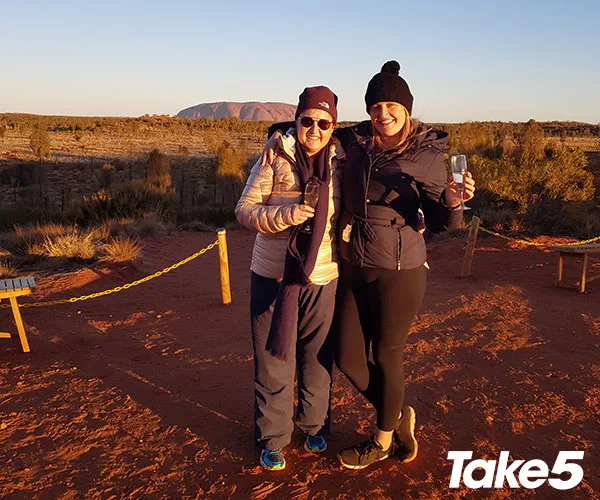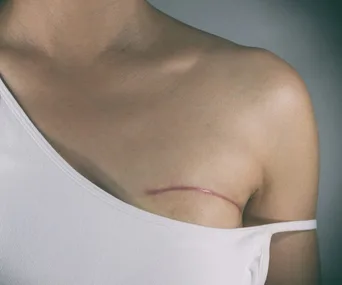Jaimee Watts, 27, from Perth, WA, shares her bittersweet story;
As I sat in the hospital waiting room with my mum, Jeanette, I shook with nerves.
Mum was diagnosed with stage-three ovarian cancer just over a year ago and was preparing for chemotherapy treatment.
During her diagnosis, she tested positive for the BRCA1 gene, meaning she was at risk of developing breast cancer, too.
“There’s a high chance that you might test positive for this gene as well,” she told me. “You should have the option of taking a DNA blood test. That way, if you test positive, we can decide what to do.”
After Mum’s diagnosis, I didn’t need much convincing.
What’s more, my Aunt Heather had passed away from breast cancer at just 31, so I got myself checked.
Six weeks later, I was with my best friend Isabel, 27, when my phone rang.
I picked it up and saw ‘Genetic Counsellor’ flash on my screen. I felt a lump in my throat as I answered.
“Hello?” I gulped.
“We have received your results and it looks like you have tested positive for the BRCA1 gene,” the doctor said.
I felt numb.

My brave mum (left) inspires me.
(Image exclusive to Take 5)“Due to your family history combined with this gene, your personal risk factor is around 80 per cent for breast cancer and around 45 per cent for ovarian cancer,” she continued.
My face crumpled as I burst into tears.
I knew that there was a high chance of me having the BRCA1 gene, but nothing could have prepared me for the moment the news was delivered.
As the weeks rolled by, I started to process it and realised there were ways to decrease my risk of cancer.
When I went to the hospital to meet the genetic counsellor, she explained my options.
The only preventative measure for ovarian cancer is an oophorectomy, a procedure to remove the ovaries, or a hysterectomy, which is the removal of ovaries and uterus.
Considering my family history, my heightened risk for ovarian cancer would begin in eight years when I turned 35, so the doctor suggested I undergo surgery then.
“Any other options?” I asked nervously.
“A double mastectomy,” she replied, adding that it would greatly reduce my chances of breast cancer.

Monica (left) and Isabel (right) have been a great support to me.
(Image exclusive to Take 5)Since I’d spent the last six weeks meticulously researching the BRCA gene through the charity Pink Hope and connecting with other women who are affected, I knew that a double mastectomy would reduce my risk of cancer down to three or four per cent.
So I made up my mind, and agreed to go ahead with the surgery.
It took me a while to come to terms with the fact that when I had a family of my own, I’d be unable to breastfeed.
There was also the risk that my chest could be numb from my ribs to my lower neck.
I knew that my new, reconstructed breasts may never look the same as my natural ones.
But if it meant avoiding cancer, then I’d do it.
When I talked to Isabel about the surgery, she hatched a plan.
“We need to throw a party – a celebration of your breasts before you have the surgery,” she said excitedly.
“Leave it to me. All you need to do is show up and bring a bunch of your old bras.”
The idea sounded so bizarre, but I went along with it.

I got a kick out of burning my bras and playing boob pinata. Laughter is the best medicine!
(Image exclusive to Take 5)A few weeks later, I stood nervously in front of my friend’s front door, hiding my bare chest protected only by heart-shaped nipple tassels under my denim jacket.
One friend led me to the backyard, which was covered in elaborate decorations, including a huge banner hanging from the roof of the house with the words “Jaimee’s Boob Voyage” and a table below it filled with snacks.
“Surprise!” my mates screamed.
There was a bonfire, a boob piñata and, best of all, a boob-shaped cake!
I laughed so much, I almost forgot about my surgery.
I ran up to my friends and hugged them.
After lots of dancing, silly games and burning my bras, an astrologist appeared and read our tarot cards for us.
“Cancer is not on the cards for you, Jaimee,” she said. ”You will live a happy and healthy life.”
When cake time came around, Isabel joked, “You’re about to perform your own surgery – careful now!”
I laughed and began cutting the cake in sections, then cut out the ‘nipples’.

I performed “surgery” on my boob cake!
(Image exclusive to Take 5)If I couldn’t laugh about this, I don’t think I could have gotten through it the way I did.
It felt reassuring discussing my future with my friends. It was the perfect send-off and I felt ready to say goodbye to my boobs.
A month later, I lay nervously on the hospital bed as I was wheeled to the operating room.

Before my double mastectomy.
(Image exclusive to Take 5)The procedure took six hours and was performed by two surgeons: a breast cancer specialist, and plastic surgeon who inserted the implants.
Waking up, there was pressure in my chest and it hurt to breathe.
I feared how my body would look under the bandages, but I also felt such a wave of relief and pride at taking control of my body.
Sadly, I needed more surgery soon after to remove my implants, due to skin necrosis and a lack of blood flow.
I had less than 24 hours to accept that I would be flat-chested for the next three months; I no longer had the luxury of flying under the radar.

I may have a flat chest, but I’m healthy – and that’s all that matters.
(Image exclusive to Take 5)I felt insecure for a week, then an enormous feeling of liberation and pride in myself.
I felt more feminine and powerful than I ever had.
This surgery has saved my life and I will always be grateful for everything I’ve been through.
I am a proud member of the BRCA community and I’m so thankful for the research that has gone into discovering my gene fault.
If it wasn’t for them, I might not have caught my cancer ahead of time and for that I’ll be forever grateful.

